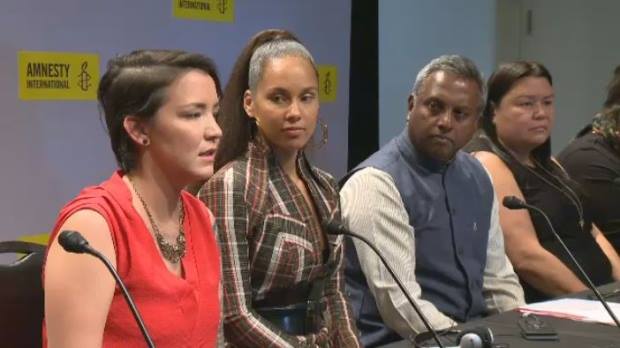In an Open Letter to Ontario Minister of Health and Long-Term Care Dr. Eric Hoskins and President and CEO of the Trillium Gift of Life Network Ronnie Gavsie, Amnesty International has called for Inuk activist Delilah Saunders to be deemed eligible for the liver transplant urgently needed to save her life. Amnesty International has also urged that no one else be denied access to organ transplants in Ontario for reasons that would be considered discriminatory under international human rights standards. The Letter notes that “denying access to treatment based on unjustified restrictions or misconceptions about the use of alcohol would contravene Canada’s obligations under international human rights law.”
“We are deeply concerned that the decision to deny Delilah access to a liver transplant is on the basis of a policy which is discriminatory and inconsistent with Canada’s international human rights obligations,” said Alex Neve, Secretary General of Amnesty International Canada. “Our heart breaks for her family and loved ones, who have already endured so much, as they work desperately to ensure Delilah receives the transplant needed to save her life. What is at stake here is not only the case of a single patient, but a discriminatory policy which denies other individuals access to potentially life-saving transplants in Ontario as well.”
Recently, Ontario resident and twenty-six-year-old Inuk human rights defender Delilah Saunders was hospitalized and diagnosed with acute liver failure, but was not put on a waitlist or deemed eligible for a life-saving liver transplant because she has not abstained from alcohol for the six-month period required under patient listing contraindication 6 of Ontario’s Adult Referral and Listing Criteria for Liver Transplantation. Her case has brought to the forefront concerns related to Ontario’s policy, and whether it complies with Canada’s international human rights obligations including “an obligation to guarantee the right to the highest attainable standard of health of all individuals, free from discrimination.”
Saunders’ work as a human rights defender is so respected that she was awarded Amnesty International’s highest and most prestigious global honour earlier this year, the Ambassador of Conscience Award. She has overcome immense personal challenges and become a prominent advocate for Indigenous rights in Canada. Following the killing of her sister Loretta in 2014, Delilah began advocating for the rights of missing and murdered Indigenous women and girls in Canada. She has also advocated for Indigenous health rights, including, in 2016, participating in a hunger strike to protest against the planned flooding of the Muskrat Falls reservoir in Labrador that would deny downstream Inuit communities the ability to safely continue their traditional diet and related cultural practices.
Delilah’s family and loved ones have launched a website and petition on her behalf. See “Is there a human right to organ transplants?” blog for further information about Amnesty International’s position.
++++++
MEDIA CONTACT: Jacob Kuehn, Press Officer, Amnesty International; +1-613-744-7667 x236; jkuehn@amnesty.ca.






















